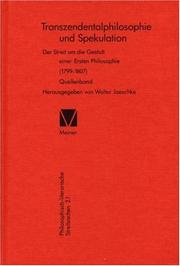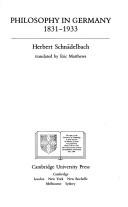| Listing 1 - 10 of 1888 | << page >> |
Sort by
|
Book
ISBN: 1554410398 Year: 2003 Publisher: Chicoutimi, Quebec : J.-M. Tremblay,
Abstract | Keywords | Export | Availability | Bookmark
 Loading...
Loading...Choose an application
- Reference Manager
- EndNote
- RefWorks (Direct export to RefWorks)
Book
Year: 1970 Publisher: [Paris,] : Seghers,
Abstract | Keywords | Export | Availability | Bookmark
 Loading...
Loading...Choose an application
- Reference Manager
- EndNote
- RefWorks (Direct export to RefWorks)
Book
Year: 1968 Publisher: Frankfurt am Main : V. Klostermann,
Abstract | Keywords | Export | Availability | Bookmark
 Loading...
Loading...Choose an application
- Reference Manager
- EndNote
- RefWorks (Direct export to RefWorks)

ISBN: 3787309969 Year: 1993 Publisher: Hamburg Meiner
Abstract | Keywords | Export | Availability | Bookmark
 Loading...
Loading...Choose an application
- Reference Manager
- EndNote
- RefWorks (Direct export to RefWorks)

ISBN: 0521227933 Year: 1984 Publisher: Cambridge Cambridge University press
Abstract | Keywords | Export | Availability | Bookmark
 Loading...
Loading...Choose an application
- Reference Manager
- EndNote
- RefWorks (Direct export to RefWorks)
Book
ISBN: 9783846725603 9783770525607 Year: 1989 Publisher: Paderborn : Ferdinand Schöningh, Brill | Fink
Abstract | Keywords | Export | Availability | Bookmark
 Loading...
Loading...Choose an application
- Reference Manager
- EndNote
- RefWorks (Direct export to RefWorks)
Book
ISBN: 1283538989 9786613851437 0739175521 9780739175521 9780739175514 0739175513 9781283538985 6613851434 Year: 2012 Publisher: Lanham, Md. Lexington Books
Abstract | Keywords | Export | Availability | Bookmark
 Loading...
Loading...Choose an application
- Reference Manager
- EndNote
- RefWorks (Direct export to RefWorks)
This book examines the crisis of values engendered by the advent of modernity, which still plagues the post-modern west today. The book examines anti-modernist thought as an attempt to reclaim traditional belief systems during a period of profound spiritual, political and economic upheaval. The dangers and psychological appeals of anti-modernism are examined in detail.
Book
ISBN: 9781438480275 143848027X Year: 2020 Publisher: Albany : State University of New York Press
Abstract | Keywords | Export | Availability | Bookmark
 Loading...
Loading...Choose an application
- Reference Manager
- EndNote
- RefWorks (Direct export to RefWorks)
Critique has been a central theme in the German philosophical tradition since the publication of Immanuel Kant's Critique of Pure Reason. Some successors turned Kant's critique against itself and used it to challenge the authority of his system. Others extended his critique, applying it to aesthetics, epistemology, ethics, metaphysics, and political philosophy and generating new forms of criticism that were then taken up by Idealism, Romanticism, Marxism, Neo-Kantianism, Phenomenology, and Critical Theory. Yet these various legacies of Kantian critique are rarely brought into dialogue. Critique in German Philosophy seeks to address this problem by exploring the figures, works, movements, and philosophical subfields that have contributed to the development of the concept of critique in German philosophy, as well as their relation to one another. In so doing, it also challenges the standard ways philosophers have understood the task of philosophical critique. Attending to both canonical and previously overlooked texts and thinkers, the contributors bring to light alternative conceptions of critique in the German philosophical tradition with profound implications. In offering a critical revision of the history of modern European philosophy, the volume also raises new questions about what it means for philosophy to be "critical" today".
Book
ISBN: 9788870883398 8870883396 Year: 1995 Publisher: Napoli: Bibliopolis,
Abstract | Keywords | Export | Availability | Bookmark
 Loading...
Loading...Choose an application
- Reference Manager
- EndNote
- RefWorks (Direct export to RefWorks)
Book
Abstract | Keywords | Export | Availability | Bookmark
 Loading...
Loading...Choose an application
- Reference Manager
- EndNote
- RefWorks (Direct export to RefWorks)
| Listing 1 - 10 of 1888 | << page >> |
Sort by
|

 Search
Search Feedback
Feedback About UniCat
About UniCat  Help
Help News
News